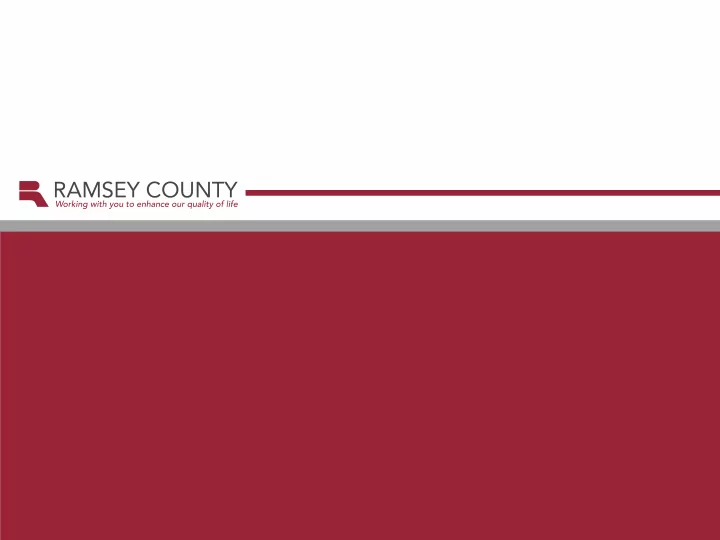

National TANF Academy July 25 th , 2016
Thank you partners Thank you our partners: Public Consulting Group-PCG Mathematica Richard Guare Center for Budget and Policy Priorities- Donna Pavetti Global learning Partners, INC-Valarie Uccellani Goodwill Easter Seals of Minnesota
4 Es Four E Strategies Executive Skill development aimed at helping families increase income through employment: Engagement Education Employment Employment Retention
Ramsey County Program Changes/Vision Ramsey County Workforce Services Vision: Greg S Reid 5
Ramsey County Program Changes/Vision Enhanced Coaching Fundamental Principles • Guiding self- determination: Steering toward participant’s dreams using coaching language and assessments • Participant unleashing power: The “can do” translated into SMART goals • Encouraging persistence: Support and recognize attempt, progress and outcome Coaching Mindset • Partnership of Equals: A partnership that honors a person’s expertise and experience • Ownership: Progress is made when individuals are in the driver’s seat • Choice: The participant is resourceful and can choose how he/she responds to life MI Spirit • Collaboration: A partnership that honors the client’s perspective • Evocation: Resources for change lie within the client • Autonomy: Affirmation of the client’s right to self-determination 6
Life Long Learning, coaching Ramsey County View: Life Long Learning Matters • All people have strengths and weaknesses with executive functioning skills. • Building executive functioning skills starts with the reduction or elimination of immediate stressors. • “Goodness of fit” between a person’s goals and her/his current (EFS) skill level is important for success. • Goal-setting is a critically important, active and client-owned process. • Small action steps over a short amount of time are critical for goal attainment. • Goal development and progress must be a concrete and an explicit process. • Teaching skills, modifying the environment and changing incentives are primary interventions for addressing executive functioning deficits. • Success is determined by the degree to which individuals confidently make their own decisions and are self-regulating and self-determining. 7
LLI Life Long Learning in practice • • Setting overall System Goal and Use of Motivational Interview Vision • MI coaching circles • Training full System • Investing in staff development • Personalized Services and • Investing in participants, education Intervention • Incentives • Leading and intervening • Redesign of services in Resource • Intervention aligned with the Centers functional level • Placement and Retention units • Creating of new tool, Goal Action • Right to choose Plan and My Bridge of Strength 8
Outcomes Outcomes: What do we measure? Major message: Work with participants as individuals with family betterment goals, guide them into activities that matter to them based on their motivation and need. Pan, Review, Re- try, Achieve. Key Outcomes: Engagement, Education, Employment, and Employment Retention Framed With the Six WIOA Goals: (1) increases access to, and opportunities for, the employment, education, training, for individuals, particularly those with barriers to employment; (2) supports the alignment of workforce investment, education and economic development systems (3) improves the quality and labor market relevance of workforce investment, education and economic development efforts; (4) *promotes improvement in the structure and delivery of services; (5) increasing the prosperity of workers and employers ; and (6) provides workforce investment activities, that increase the employment, retention, and earnings of participants, and increase attainment of recognized postsecondary 9
Enhanced coaching has an explicit focus on executive skill, goal setting and goal achievement Executive skills are a set of processes that help us choose our goals, guide our behaviors so that we can manage day-to-day life, and reach our goals Executive skills help us work around the behaviors that can derail our progress 10
Executive/Essential Skills Executive Skills Skills we use to organize and Skills we use to control how we Skills we use to get things done plan things react to situations Organization Response Inhibition Task Initiation creating and maintaining thinking before you act, beginning projects without systems to keep track of resisting the urge to say or do undue procrastination; taking information or materials. something one might regret the first step. later. Time Management Flexibility Sustained Attention believing that time is switching up when things get in pulling back from being important, estimating how our way; adapting to obstacles distracted, tired and bored to much time one has, deciding or setbacks. the person or task that is right how to use it, and staying in front of us. within limits agreed to. Planning/Prioritization Emotional Control Goal-Directed Persistence creating a road map to reach a managing emotions in order to following through to the goal or to complete a task. achieve goals, complete tasks, completion of the goal and not Making decisions about what is or control and direct behavior. being put off by or distracted important to focus on and what by competing interests. is not important. Stress Tolerance Working Memory doing well even in uncertainty, holding information in our change, and high demands. minds while doing something new or complex. Metacognition Looking at how we are acting, how we handle ourselves, and how we affect other people.
Tools Useful with Enhanced Coaching: • Overview • Getting to Know You Form • Executive Skills Questionnaire • My Bridge of Strength • Goal Action Plan (GAP) • Career Pathways Action Plan • My Task Plan • My Task Review • Observation • Pocket guides 12
Feedback and outcomes Focus group with families Positive feedback Peer to Peer observations Supervisor observations Setting up Fidelity for intervention and hiring practices Improvement in engagement and employment outcomes WPR remains steady
Thank you Kate Probert Fagundes Employment Services Division Manager 651-779-5655 kate.probert@co.ramsey.mn.us
Recommend
More recommend